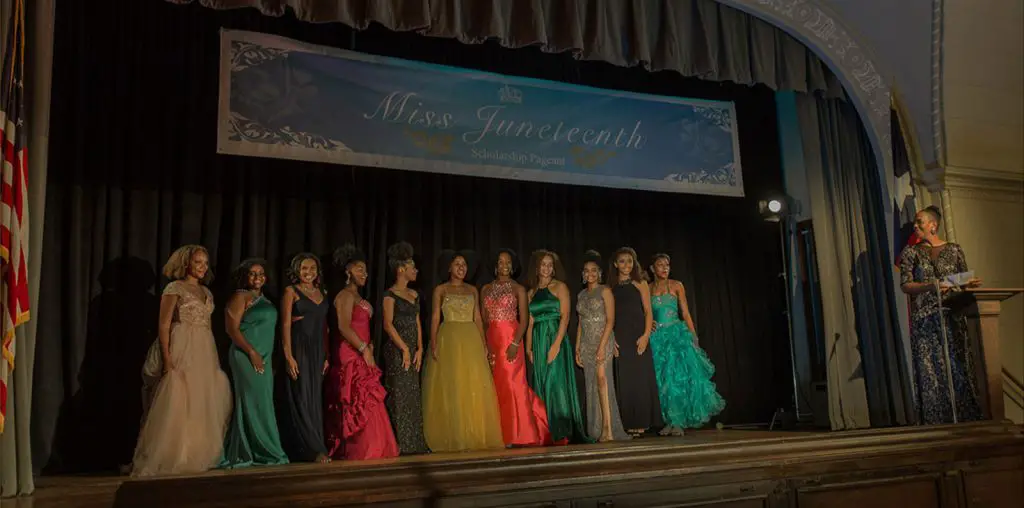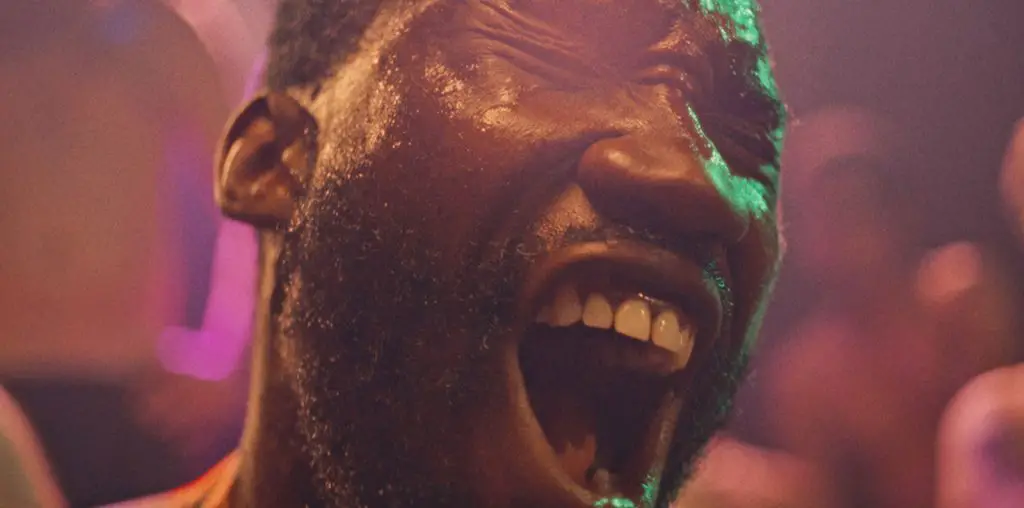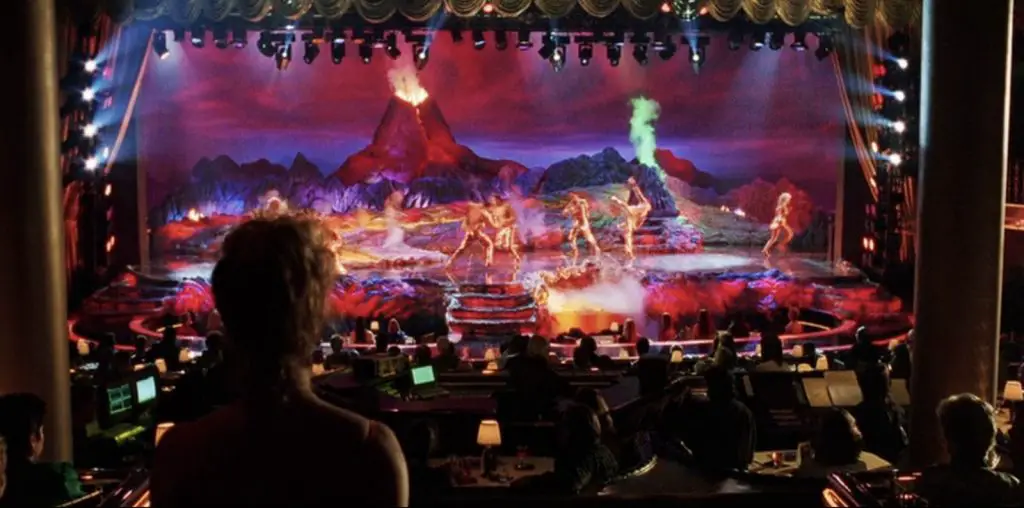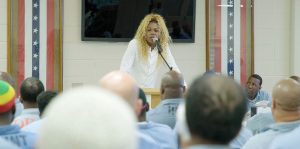
Big Freedia is a bounce music legend in New Orleans. If you don’t know what bounce music is, the Wikipedia entry says, “Bounce is characterized by a call-and-response-style party and Mardi Gras Indian chants and dance call-outs that are frequently hypersexual and controversial.” Big Freedia is inarguably the most famous Bounce artist, having worked with Beyonce, Drake, Kesha, Lizzo, and many more.
I had always thought of Big Freedia as an energetic powerhouse and would have never thought a movie about her would leave me so incredibly sad, but in the documentary, Freedia Got A Gun, we see the more serious side of Freedia’s life. We find out about her brother’s murder in 2018, and many of the other people she’s lost in New Orleans over the years to gun violence. Freedia takes many steps to help the community, and we are introduced to many other people and organizations that are devoted to stopping the violence in NOLA.
I was delighted to talk to both Big Freedia and director Chris McKim, both of whom worked together on Big Freedia’s FUSE show Big Freedia: Queen of Bounce about this wonderful documentary they put together. It takes those of us who grew up in relatively cushy surroundings on a tour of a different side of life that is often wrought with pain from a very early age.
The interview was split into two sessions. I’m happy she took the time to answer my questions. Chris McKim had so much thoughtful commentary on the film, I’m very glad I got to speak to him. Both interviews are here below. Freedia Got A Gun played at AFI Docs Film Festival on June 19th, 2020.
Firstly, here is my talk with Big Freedia:
Before we talk about the movie, I think it’s pretty relevant to talk about the George Floyd incident and the resounding protests. How do you feel about them, and what do the protests look like in New Orleans?
Big Freedia: I’m so proud of my city and the protesters. I love seeing everyone come out and demand change. The demonstrations have been peaceful here in New Orleans. There are always a few bad apples, but I think the majority of people are here for the right reason!
You have been through so much over the years, what with Hurricane Katrina, losing several family members and friends to gun violence, and being shot yourself…what do you do to cope?
Music, cooking, church, being with my family–those are all the ways I cope. Being creative!
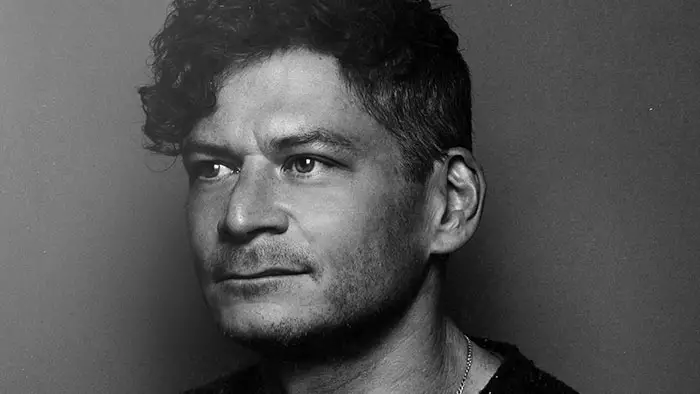
“I’m so proud of my city and the protesters. I love seeing everyone come out and demand change.”
How did the idea for the movie come about?
Randy Barbato and Fenton Baily of World of Wonder came to me about it. They were the producers of my Fuse TV show, and they have been so supportive of me. So when my brother got shot, it was like, how can we use this terrible tragedy for something good? They asked me what I thought about the idea of a movie about gun violence, and I thought, “Yes, let’s do it!” I knew Chris McKim from the show as well, so they brought him on as the director.
When I was talking to Chris, he told me that your brother Adam’s murder investigation is still open, have you found anything out since the movie?
No, it’s still open.
Can you talk about the importance of community in effecting change in areas such as gun violence?
I think we all have to demand better and demand change as a community.
Have you kept up with Devin, the 14-year-old boy with 14 charges who lost his father to gun violence? Last heard he was in a group home, do you know how he’s doing now?
Yes, I have. He is still in a group home and is doing just fine.
What can we do as people outside of New Orleans to help effect change in the community? Can we donate to any of the organizations such as the peacekeepers?
Sure, but I think every community in America has a violence problem, so you can donate to any organization in any city.
What would you say to a group of politicians about what they should do about gun violence around the country?
At the minimum, I think there needs (to be) much stricter background checks on people who are trying to buy guns.
What do you want people to come away with after watching Freedia Got A Gun?
I hope younger people come away with thinking hard about carrying guns. I hope they can realize in an instant they can die––and over nothing. I also hope this can give some light to the Black Lives Matter cause and police brutality. It seems that racism is finally sinking in with the American public, and I hope that this is just one more story that can help shed light on this problem!
Once again, Big Freedia, thank you so much for putting up with all the technical difficulties, and I wish you all the best. I’m from Atlanta, and you have a ton of fans down there!
Here’s what happened in my conversation with Chris McKim:
I wanted to know – how did you get connected with Big Freedia, to begin with?
Chris McKim: Well, I’ve known and worked with Freedia since 2014. I came on to season 3 of her docu-series as the showrunner and EP. So, I worked three seasons of that, and you know along the way you spend a lot of time together, become friends, and all of that. We sort of bounced around the country on tour, to Europe and such. And I actually first met Adam, her brother, when I first started on the show. Yeah. It was the first season I was on. We were doing her tour, the “Just Be Free” tour, and Adam and Crystal, their sister, came to Washington DC because it was their late mother’s birthday. That night was the show at the Howard Theatre, and it was in honor of their mother. So that was when I first met Adam.
Oh wow. So that must ‘ve- so how did this come together? Did you guys work together to come up with this idea? Or was it something that Freedia came to your attention with? Or how did the movie become what it was?
So our relationship was born out of storytelling and so not long after the passing, Randy and Fenton, and I were talking about things. Randy and Fenton actually reached out to Freedia directly to talk about the idea of doing the project. And she was on board, and so you know the evolution of it was really just starting with Freedia’s story and her experience in New Orleans. Not just with Adam’s death, but all the gun violence that she’s experienced and that so many of the people down there even in the film have experienced throughout their lives. Freedia mentions in the film that she lost like 60 or 70 people over the course of- and I saw the list, and we were trying to count- and she just lost track of names. It’s very common down there. I think Dr. Ashonta Wyatt said a similar thing in the film about knowing people that are killed and have been killed and all of that. So starting with Freedia’s story, the film just sort of expanded out to the community, and it was just a lot of listening and trying to make the most of the opportunity to tell their stories in a way that was true to what they were telling us.
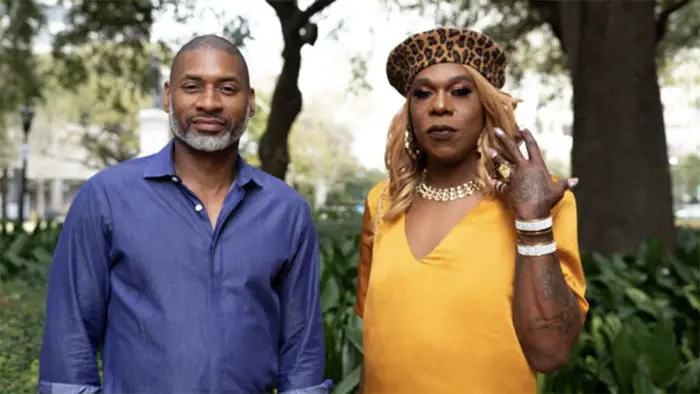
“These are people of the community, and their purpose is to stop killings before they happen.”
I’m just wondering in your own youth, did you face any kind of similar circumstances, or was there anything that happened with you that made you passionate about the story? Or maybe more passionate about it?
I mean, I try to only take projects on that I feel a passion for. And of course, you know my relationship with Freedia, our shared experience, is being queer. So that is the basis of our relationship. In terms of my own childhood, I grew up in the middle of nowhere. I was like 45 minutes north of Pittsburgh in the woods. So, I had no town.
So our experience is probably, you know, as far as they can be. Which is interesting because Charles Blow, also from Louisiana as of course Freedia is, but in a similar kind of way hundreds of miles away in the woods, the country of Louisiana- and also had a very different experience.
Yeah, it’s strange how you can be so close, and it just is so different. I was really curious about this. So, there was something on the screen that said that the NOPD declined to be involved with the film. I was wondering if there was any kind of story behind that.
No, just repeated requests. Initially, their first no could have been taken that it had something to do with that Adam’s case was, and still is, an open investigation. But then subsequently we made clear that we don’t have to talk about this open case. There’s a lot of issues in the community that could be discussed, but the answer was still the same. They just were not going to participate, and there was not any elaboration on their part.
Well, Freedia Got A Gun being released the time at that it is, kind of coincides with the George Floyd incident and a lot of other incidents with gun violence by the police. And I was just wondering sort of how you felt about that and how this film fits in that conversation?
You know, I think one of the interesting things is the—one of the themes of the protest, you know sayings is defund the police. And when people talk about that, there are elements in the film that are exactly where money could be moved from the police departments to groups like the Peacekeepers and Ceasefire, which is the group that Calvin Pepp, the violence mediator in the film works for. He’s the man that sits down with them. These are people of the community, and their purpose is to stop killings before they happen. And the two groups work in different ways, but they’re both basically mediating differences, which seems like a lot more useful and important than just waiting for that to happen. So it’s interesting, had we been doing this film now, of course, there are things that are slightly more topical that we probably would’ve underlined more in a certain way. That being one of them. And also your question about the police, it’s like I think there’s a card up there too- I will get the percentage wrong off the top of my head, but you know there’s a low percentage of solved murders in New Orleans. And of course, part of that is there’s no trust between the police and the community. People aren’t speaking up, and that mistrust is based on lifetimes of experience with police that they’ve had in that city.
Well yeah, I mean just the systemic racism that’s kind of inherent with this existence too.
Yeah, and even that incident in the film with Cardell Hayes’ father right after Katrina, being shot, you know, surrounded with something like 16 cops and being shot nine times dead and there’s news footage of him. There’s no reason- a man is surrounded by that many policemen, and he needs to be shot and dead.
How was it being around all of the kids who had already dealt with so much violence at a young age? How did that make you feel?
Oh my, I mean, it was hard. And I will say that this is a testament to Dr. Wyatt, not just with the work she does and the trust that she has with her kids and her students, and how well she knows them and how willing they are to share their lives. But, you know I personally, if you just set me in a room with them I never would’ve pushed – you know what I mean? I wouldn’t know how to do it, and I wouldn’t want to because I wouldn’t want to put- you know coming from strictly behind the camera- I would be concerned about them. And that’s not the case. She knows them, and she knows their stories, and there’s a real bond and love there. And that’s honestly to me that on top of the compounded horror of what each kid had said. And that makes sense because I knew that Freedia had lost so many people throughout the years. And it’s like, “oh, right”. If you think about it, that’s what these kids are growing up with. And I think that’s one of the things when these cities- New Orleans, Baltimore, Chicago- are in the news. You just hear about stats and crime and law and order, but you don’t think about the community and the people truly affected.
I mean, yeah. Something that I wanted to ask about that is how essential do you feel that community is to prevent these problems? And with the programs that you were talking about before- the Peacekeepers and what’s the other one?
Ceasefire.
Is there any way that anybody who doesn’t live in New Orleans or anyone who sees the movie, is there any way to contribute to them to help them?
They both have presences online, and they are both part of larger organizations. So anyone in one of these larger cities, certainly Chicago and I think Baltimore, both have their own chapters as well. I mean the community is essential because as much as we do have to deal with the systemic racism that fuels this type of violence and all sorts of problems in the black community, whether its health, education, trauma- they can’t wait for that. They’re trying to save kids in real-time. They’re trying to save people in real-time. And I think that’s more than anything where the community is so important, on top of constantly pulling attention to these problems and hoping a broader change can come about.
I thought that it was very- it had a heaviness to it, and I still am thinking about it now. So, it was a very good movie, and I really enjoyed it. You also did work on a documentary about David Wojnarowicz, and it was supposed to come out at Tribeca. I’m wondering how did these two line up chronologically? And were you just working nonstop for years? How did they coincide?
Wojnarowicz started as an idea in July of 2017. That’s when I first reached out to PPOW, which is his final gallery, and they manage the estate. And at the time it was Tom Rauffenbart, David’s partner, who has passed away. But, that was really the launch of the project. I reached out, they were on board, then I spoke to Randy and Fenton and told them about it, and they were on board. And so, it was a two and a half year process. But actual filmmaking it was really March of last year through the beginning of this year, I had done one set of interviews. And so that project was already in the mix when Freedia’s brother was still alive when we started that project – he passed away in January 2018. And so, then they just started overlapping. It wasn’t until late last summer when they were both happening at the same time. There would frequently be breaks on Freedia, where I went to do interviews for Wojnarowicz, and then I came back. And so the last 7 or 8 months were pretty hairy at that time in terms of working on both. But there’s a lot to the Wojnarowicz film and what David’s work was about that speaks very much to now.
It’s sort of like this one tribe mentality that America is run on and protests and corruption. And one of the messages of that film- something that David says in the film- is that if the work that we make as artists doesn’t contribute to the resistance, we’re helping the system of control become more perfect. And that sort of became, without it being those words, that was my guiding star creatively in projects. Especially the last few years as I tried to get out of reality (television). I just want to do projects that have that same kind of energy and light to them but can also hopefully contribute to a true greater good in ways that help dismantle the worst parts of society.
Totally. I’m really looking forward to seeing the Wojnarowicz documentary, and maybe we can talk about that once I see it.
Chris McKim: Indeed. Yeah, I’d love to.
